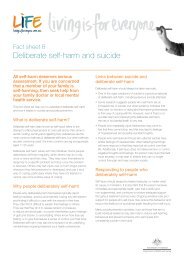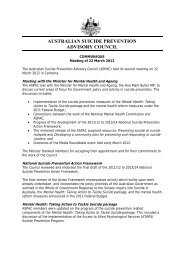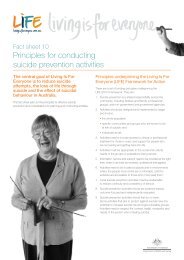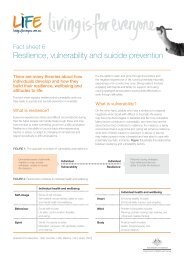Information & Support pack ACT - Living is for Everyone
Information & Support pack ACT - Living is for Everyone
Information & Support pack ACT - Living is for Everyone
You also want an ePaper? Increase the reach of your titles
YUMPU automatically turns print PDFs into web optimized ePapers that Google loves.
Do men and women grieve differently?Gender <strong>is</strong> one of the factors that impact on how you grieve and may affect your style of grieving.Generally, men tend to be physically active in their grief. Th<strong>is</strong> may involve sorting out practical problems inthe family, completing projects in memory of the person who has died or other physical activity. They mayalso express more anger about the death than women.Women are more likely to be openly expressive about their emotions and find support from sharing th<strong>is</strong> withothers. Some women may withdraw to cope with their d<strong>is</strong>tress.These are very broad general<strong>is</strong>ations but they do indicate that there are different ways to grieve. Thesedifferences can put a strain on relationships. If your partner does not grieve in the same manner as you, it<strong>is</strong> easy to become resentful thinking that they do not share your loss or they don’t care. It <strong>is</strong> important torecogn<strong>is</strong>e that people grieve in different ways. The different styles of grieving do not mean you loved theperson any more or any less.Do people from different cultures grieve differently?Grief <strong>is</strong> a universal response to loss. However there may be cultural differences about how to deal with grief.Some cultures have very specific rituals. Th<strong>is</strong> may mean that people from different cultures or religions showtheir grief differently or act differently after a death in the family.Why can’t some of my family help me?Each person will have had a different relationship with the person who died and their experience of the losswill be different. Their way of expressing their grief may also be different. Recogn<strong>is</strong>ing th<strong>is</strong> can help yoube more tolerant and understanding of each other. Let others grieve in their own way. Don’t compare griefreactions. <strong>Everyone</strong> will go through the process in their own way, in their own time.Am I going mad?The feelings you experience when grieving could seem abnormal and out of control under othercircumstances. You are not going mad, you are grieving.What about drugs and alcohol, do they help?At times people find it helpful to use prescription medication <strong>for</strong> a few days as a ‘first aid’ measure. Howeverusing alcohol or drugs long term to relieve the painful feelings will only prolong and complicate your grief.Are there more difficult days and times?Anniversaries, birthdays, Chr<strong>is</strong>tmas and holidays can be difficult times. It may be useful to plan ahead. Youmay decide to do things differently and create new traditions on these days. You may want to find new waysto remember the person who has died. D<strong>is</strong>cuss with your family how these times might best be celebrated.Would it help to move?Although it may be tempting to move or change jobs in the hope that th<strong>is</strong> will ease some of the pain, it <strong>is</strong> agood idea not to make any major or permanent dec<strong>is</strong>ions <strong>for</strong> 12-18 months after the death of a loved one.You are already undergoing enormous change because of the loss. If your dec<strong>is</strong>ion does not have to bemade immediately, leave it <strong>for</strong> a while.It’s become worse, why?There may have been a lot of v<strong>is</strong>itors and support around the time of the funeral but people have sincemoved on with their lives. People often expect that you will have “got over it” after 6-8 weeks. Th<strong>is</strong> leavesyou on your own and without the constant support of these friends. The ‘anaesthetic’ effect of the shock alsowears off leaving intense and painful feelings. People often say that the grief <strong>is</strong> worse 4-6 months after thedeath rather than at the time of the initial bereavement.28
















